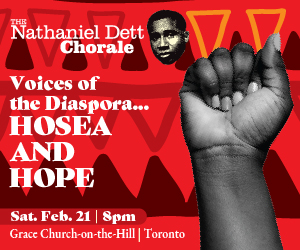On January 20, TrypTych gave the world premiere of Frankenstein by Andrew Ager, composer-in-residence at Toronto’s St. James Cathedral. TrypTych has previously presented individual scenes from the opera, but on the 20th and 22nd (when I attended) we were supposedly seeing the completed work. I hope this is not true. The 70-minute minute piece has so much potential and Ager’s music so evocative that it really should be at least half again as long.
William Whitla’s five-scene libretto adheres closely to Mary Shelly’s original novel and thankfully dispenses with all of Hollywood accretions of schlock that have so distorted the tale. The opera, like the novel, is not a horror story but a philosophical meditation on the relation of creator and creation. Again and again there were moments when I wished the librettists would pause the action and allow characters to reflect more fully on their situation. Victor Frankenstein and the Monster both flee the laboratory after the Monster’s animation, but we really need to know more how each feels about that experience. The Monster peers in at the family he has secretly been helping. This would be a perfect time to have him reflect on the peace he sees inside and the alienation he feels outside. The use of Milton’s Paradise Lost as a parallel text in the De Lacey family scene could be much more extended.
There are dramaturgical problems. Frankenstein and the Monster should not really have their central encounter while a boy’s body lies ignores on the ground. The deaths of Frankenstein’s wife and brother really don’t need to be shown in the final scene since they tend to pitch the tone into melodrama, which it had till then avoided.
Despite this, the opera is gripping from start to finish. I wanted more because what there was, was so enjoyable. The librettists have boiled the story down to its bare essentials which are even more timely now when mankind really can artificially create life. Ager himself played the score on a grand piano, where it sounded like a gorgeous post-impressionist tone poem, lush yet propulsive, where constantly shifting tonalities reflected the morally ambiguous world of the story.
Of the cast of eight, Stephen King was the clear standout with a bass-baritone voice of great beauty and power, whose fine singing and acting painted the Monster in the most sympathetic light. As Victor Frankenstein, tenor Lenard Whiting had some difficulty with the highest lying notes, but successfully replaced the caricature of the “mad scientist” with a more psychological portrait of obsession. Baritone Michael York used his well rounded tone to characterize and differentiate the anger of Victor’s father from the serenity of Old Mr. De Lacey. Michael Taylor and Melanie Conly beautifully sang a duet celebrating the married bliss of Felix and Agatha De Lacey. Eleven-year-old Charles Waddell clearly showed abundant talent as Victor’s nephew. Though Graham Robinson and Dawn Bailey were given little to do as Victor’s best friend and his fiancée, they did it well.
Director and designer Edward Franko worked wonders in staging such a work on a microscopic budget. The performance was enthusiastically received – but I still feel an expanded version would have a greater chance of attracting the interest of other companies.
Christopher Hoile



